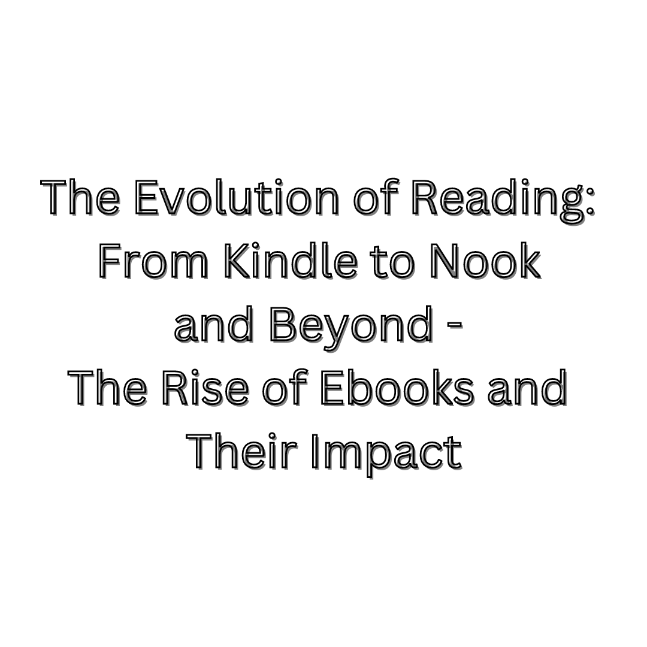The Evolution of Reading: From Kindle to Nook and Beyond - The Rise of Ebooks and Their Impact

In the last two decades, the landscape of reading and publishing has undergone a significant transformation, thanks to the advent of ebooks and their accompanying devices like the Kindle and Nook, as well as various ebook reader apps for mobile devices. This article explores how these technological advancements have reshaped our reading habits and the benefits they offer.
Kindle: The Revolution Begins
The Kindle, launched by Amazon in 2007, was a groundbreaking device that marked the beginning of a new era in reading. It offered a novel way to consume books: digitally. The Kindle's e-ink technology mimicked the appearance of actual paper while being gentle on the eyes, a feature appreciated by avid readers. The convenience of storing thousands of books in a single, lightweight device was a game-changer.
The Nook: Barnes & Noble's Answer
Not far behind, Barnes & Noble introduced the Nook. This device expanded the market, offering a similar e-ink technology but with the addition of a color touch screen for navigation. The Nook further popularized the concept of ebooks, drawing in a demographic that preferred a more interactive and colorful display.
Ebooks: A New Format for Literature
Ebooks, the digital counterparts to physical books, have seen a surge in popularity. They offer several advantages over traditional books. Firstly, they are often more affordable, making reading more accessible to a broader audience. Secondly, they are instantly downloadable, eliminating the need for physical storage space and the wait for delivery. Lastly, many ebooks offer interactive features such as adjustable font sizes, integrated dictionaries, and note-taking capabilities, enhancing the reading experience.
The Rise of Ebook Reader Apps
With the increase in smartphone usage, ebook reader apps have become increasingly popular. These apps turn any mobile device into an ebook reader, providing a convenient way for people to read on the go. Popular apps like Kindle App, Apple Books, and Google Play Books offer a vast selection of titles and sync across devices, allowing users to pick up right where they left off.
Ebooks on Mobile: Reading Redefined
The proliferation of ebooks on mobile devices has further democratized reading. People who might not afford a dedicated e-reader can now access a vast library of books on a device they already own. This ubiquity has made it easier for people to read in their spare time, whether commuting, waiting in line, or during lunch breaks.
The Advantages of Ebooks
Ebooks come with a host of benefits that enhance the reading experience. They are eco-friendly, reducing the need for paper and the environmental impact associated with printing and shipping physical books. Their portability allows readers to carry an entire library in their pocket. Furthermore, many ebooks offer interactive and multimedia elements, making reading a more engaging experience, especially for educational purposes.
Conclusion
The evolution from physical books to ebooks, facilitated by devices like the Kindle and Nook, and complemented by the widespread availability of ebook reader apps on mobile devices, represents a significant shift in how we consume literature. This shift not only makes reading more accessible and convenient but also opens up new possibilities for interactivity and engagement with text. As technology continues to advance, it will be exciting to see how the world of ebooks evolves further, continuing to redefine the experience of reading for people around the globe.
You may also like…






